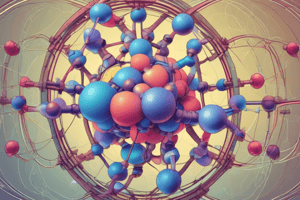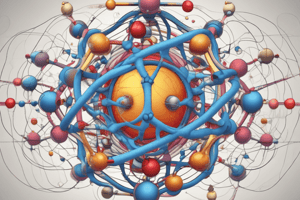Podcast
Questions and Answers
Chemistry is the scientific field that studies the properties, composition, and interactions of ______, which is anything that has mass and occupies space.
Chemistry is the scientific field that studies the properties, composition, and interactions of ______, which is anything that has mass and occupies space.
matter
Chemists study the behaviors of elements and their ______, and they strive to predict and explain how they change when they react to form new substances.
Chemists study the behaviors of elements and their ______, and they strive to predict and explain how they change when they react to form new substances.
compounds
This understanding of chemistry is crucial for many aspects of our daily lives, from the ______ we eat to the air we breathe and the substances we use in industry.
This understanding of chemistry is crucial for many aspects of our daily lives, from the ______ we eat to the air we breathe and the substances we use in industry.
food
Organic chemistry is the study of ______-containing molecules, which are essential for life and form the basis of many industrial products.
Organic chemistry is the study of ______-containing molecules, which are essential for life and form the basis of many industrial products.
Inorganic chemistry is the study of ______-containing elements and their compounds, such as metals, minerals, and inorganic salts.
Inorganic chemistry is the study of ______-containing elements and their compounds, such as metals, minerals, and inorganic salts.
Research topics in organic chemistry can include the synthesis of new ______, the study of reaction mechanisms, and the development of new methods for controlling the stereochemistry of reactions.
Research topics in organic chemistry can include the synthesis of new ______, the study of reaction mechanisms, and the development of new methods for controlling the stereochemistry of reactions.
Research topics in ______ chemistry can include the study of metal complexes, the synthesis of new alloys and other materials, and the exploration of catalysts for various chemical reactions.
Research topics in ______ chemistry can include the study of metal complexes, the synthesis of new alloys and other materials, and the exploration of catalysts for various chemical reactions.
The study of methods for determining the composition of matter, such as spectroscopy, chromatography, and ______, is a part of analytical chemistry.
The study of methods for determining the composition of matter, such as spectroscopy, chromatography, and ______, is a part of analytical chemistry.
Chemistry is essential for the development of ______ and pharmaceuticals, and it plays a crucial role in many areas of modern society.
Chemistry is essential for the development of ______ and pharmaceuticals, and it plays a crucial role in many areas of modern society.
Chemistry is crucial for the development of clean ______ sources and the mitigation of the harmful effects of greenhouse gases.
Chemistry is crucial for the development of clean ______ sources and the mitigation of the harmful effects of greenhouse gases.
Chemistry is at the heart of the development of new ______, from plastics and polymers to metals and alloys.
Chemistry is at the heart of the development of new ______, from plastics and polymers to metals and alloys.
Chemistry is essential for the development of safer and more sustainable ______ production methods, as well as the creation of new food products and processing techniques.
Chemistry is essential for the development of safer and more sustainable ______ production methods, as well as the creation of new food products and processing techniques.
Study Notes
Chemistry: The Study of Matter and Its Interactions
Chemistry is the scientific field that studies the properties, composition, and interactions of matter, which is anything that has mass and occupies space. From the familiar elements like hydrogen, chlorine, silver, and copper to lesser-known ones like selenium, rubidium, and hassium, all matter is composed of various combinations of these basic elements.
Chemists study the behaviors of these elements and their compounds, and they strive to predict and explain how they change when they react to form new substances. This understanding is crucial for many aspects of our daily lives, from the food we eat to the air we breathe and the substances we use in industry.
Subfields of Chemistry
There are many different branches of chemistry, each with its own focus and research topics. Some of the main subfields include:
Organic Chemistry
Organic chemistry is the study of carbon-containing molecules, which are essential for life and form the basis of many industrial products. Research topics in organic chemistry can include the synthesis of new compounds, the study of reaction mechanisms, and the development of new methods for controlling the stereochemistry of reactions.
Inorganic Chemistry
Inorganic chemistry is the study of non-carbon-containing elements and their compounds, such as metals, minerals, and inorganic salts. Research topics in inorganic chemistry can include the study of metal complexes, the synthesis of new alloys and other materials, and the exploration of catalysts for various chemical reactions.
Physical Chemistry
Physical chemistry is the study of the physical and chemical properties of matter, such as thermodynamics, kinetics, and photochemistry. Research topics in physical chemistry can include the study of phase transitions, the development of new materials, and the understanding of chemical reactions at the molecular level.
Analytical Chemistry
Analytical chemistry is the study of methods for determining the composition of matter, such as spectroscopy, chromatography, and electrochemistry. Research topics in analytical chemistry can include the development of new analytical techniques, the study of new materials for analytical applications, and the application of chemistry to environmental and medical problems.
Chemical Engineering
Chemical engineering is the design and application of chemical processes, such as the production of pharmaceuticals, the development of new materials, and the treatment of wastewater. Research topics in chemical engineering can include the optimization of chemical processes, the development of new materials, and the study of chemical reactions in industrial settings.
Chemistry in Our World
Chemistry is essential for our daily lives, and it plays a crucial role in many areas of modern society. Some examples of how chemistry is used include:
Medicine and Pharmaceuticals
Chemistry is the basis for the development of new drugs and treatments for various diseases. Chemists work to understand the molecular structure of disease-causing organisms and develop new compounds that can target these organisms.
Energy and Environment
Chemistry is crucial for the development of clean energy sources and the mitigation of the harmful effects of greenhouse gases. Researchers are working on the development of new catalysts that can convert carbon dioxide into more useful forms, such as jet fuel or other energy sources.
Materials Science
Chemistry is at the heart of the development of new materials, from plastics and polymers to metals and alloys. These materials have a wide range of applications, from construction and transportation to electronics and energy storage.
Food and Agriculture
Chemistry is essential for the development of safer and more sustainable food production methods, as well as the creation of new food products and processing techniques.
Cosmetics and Personal Care
Chemistry is also used in the development of new cosmetics and personal care products, from shampoos and soaps to lotions and creams. These products must be safe and effective, and chemists work to understand the interactions of these compounds with the skin and other biological systems.
In conclusion, chemistry is a fascinating and essential field of study that has a profound impact on our daily lives. From understanding the properties of matter and the mechanisms of chemical reactions to the development of new materials and technologies, chemists are at the forefront of scientific discovery and innovation.
Studying That Suits You
Use AI to generate personalized quizzes and flashcards to suit your learning preferences.
Description
Explore the fascinating world of chemistry, from the properties of matter to the various subfields and their applications in our daily lives. Learn about the importance of chemistry in medicine, energy, materials science, and more.



